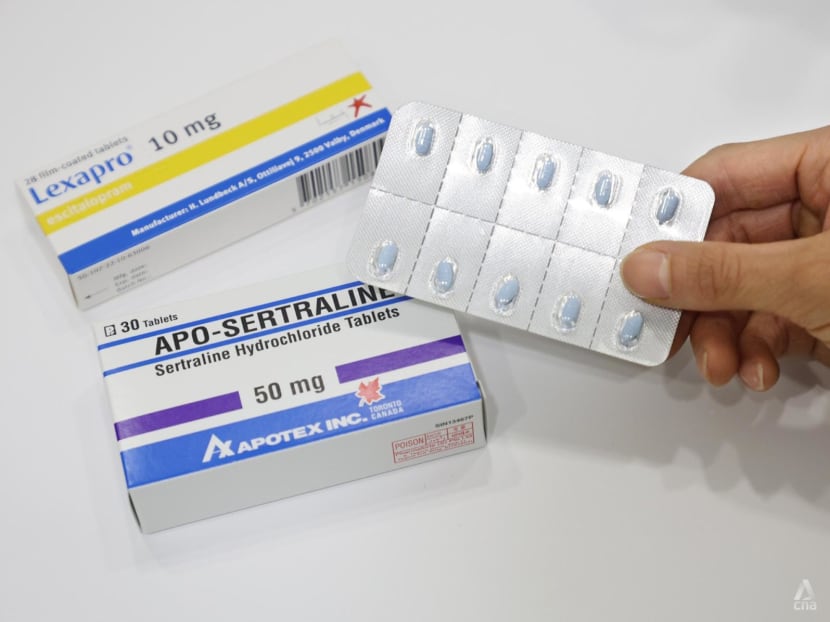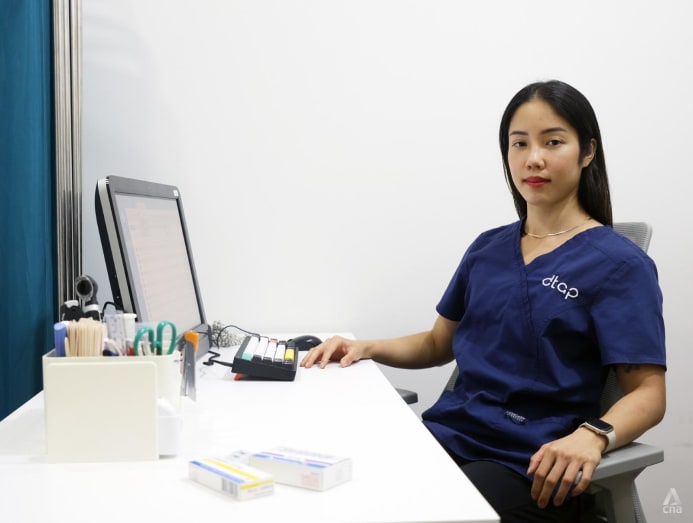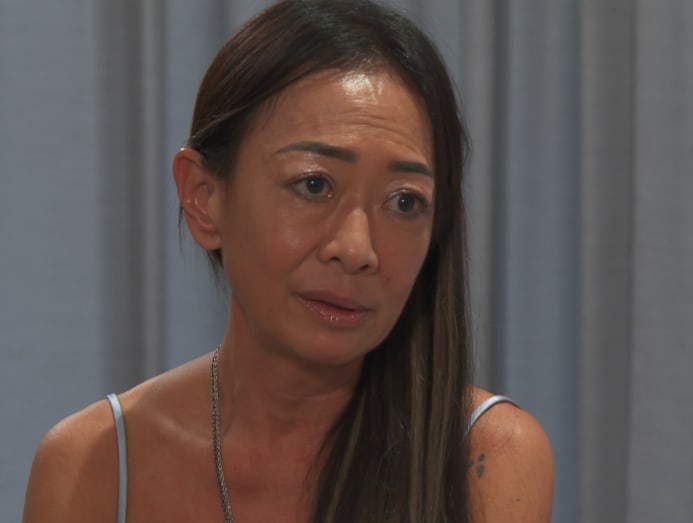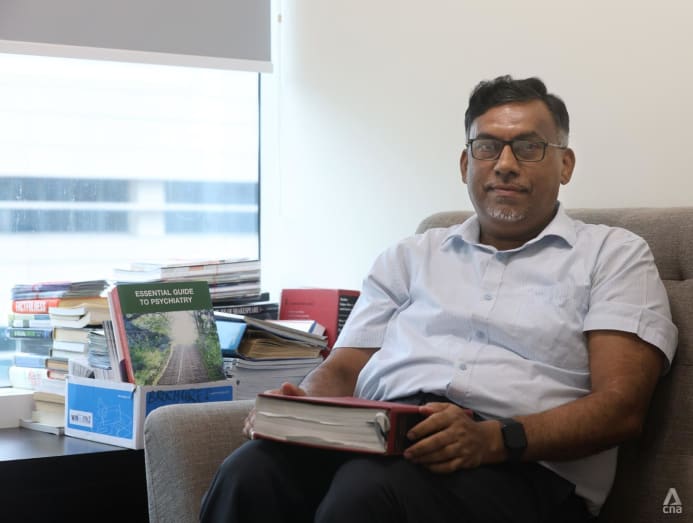More Singaporeans are being prescribed antidepressants. Is this a cause for concern?
Doctors said that when prescribed and used properly, antidepressants can be helpful in treating symptoms, but they warn against over-reliance on these drugs or trying to obtain them without prescription.

Two types of antidepressants, sertraline and escitalopram, photographed at a branch of DTAP Clinic on Nov 27, 2024. (Photo: CNA/Ooi Boon Keong)

This audio is generated by an AI tool.
Diagnosed five years ago with depression at the age of 19, Ms Ashley Poo was prescribed a daily dose of fluvoxamine — an antidepressant meant to treat her depressive symptoms.
However, her experience with the drug was far from pleasant even at the beginning.
Almost immediately after starting the medication, she had uncomfortable bouts of nausea, a loss of appetite and even increased suicidal thoughts.
The now 24-year-old project coordinator said that these side effects lasted for about a month before they started to dissipate — and November marks exactly five years since Ms Poo began her regular course of antidepressants.
Ms Poo is part of a growing group of young adults in Singapore in recent years who have been prescribed a class of antidepressants known as "selective serotonin reuptake inhibitors”, or SSRIs.
SSRIs have been around since the late 1980s and are the most commonly prescribed type of antidepressants. They work by increasing the levels of serotonin in the brain, a neurotransmitter that helps regulate mood.
They may be used to treat a number of mental health conditions in addition to depression, such as anxiety and obsessive compulsive disorder.
The Ministry of Health (MOH) said that around 53,000 patients were prescribed SSRIs yearly in 2022 and 2023. This is up from the average of 50,000 a year between 2017 and 2021.
On the whole, prescriptions for SSRIs increased by a “compound annual growth rate of 5 per cent” from 2018 to 2022, MOH added. This equates to an increase of at least 20 per cent in that period.
Although 2023 saw a 3.8 per cent fall in all SSRI prescriptions, various general practitioner (GP) and specialist clinics told CNA TODAY that they have observed more young adults seeking help for mental health conditions such as depression since the onset of the COVID-19 pandemic.
If the ages of patients prescribed with SSRIs are dissected, the proportion of young adults aged 18 to 24 has increased somewhat steadily — from 11.2 per cent in 2017 to 15.5 per cent in 2021, before standing at 14 per cent last year.
The overall increase in antidepressant prescriptions is not surprising for several reasons, doctors said.
For one thing, mental illness has undergone substantial “destigmatisation” in society.
Dr Victor Kwok, medical director and senior consultant psychiatrist at Private Space Medical, said that he has seen “a lot more” young adults visiting the clinic of their own accord after the pandemic, often armed with a surprising amount of self-awareness.
“These young patients are better able to recognise their symptoms and analyse the reasons for their triggers. The language they use is often very sophisticated — like that of therapists,” he said.
Still, given the significant rise in antidepressant prescriptions among the young in recent years, are these drugs being prescribed too quickly, and could there be dangerous implications for the patients?
CNA TODAY takes a closer look.
COULD ANTIDEPRESSANTS BE PRESCRIBED TOO EASILY?
The overall increase in SSRI use in itself is not necessarily concerning, some doctors told CNA TODAY, but the reason these antidepressants were prescribed should be examined more closely.
Could it be possible that young adults are willing to turn to these medications too quickly, albeit with the agreement of doctors, leading them to become over-reliant on antidepressants?
Like Ms Poo, the initial experience that 31-year-old communications professional Lisa (not her real name) had with antidepressants was not ideal.
There were points where she felt “even crazier” – but her symptoms of depression gradually improved after two weeks.
Lisa was diagnosed with depression in 2015 and since then, has been on a prescription of escitalopram, a type of SSRI. She did not want to be publicly identified because she did not disclose her mental illness to her employer.
“I used to wake up with a heaviness in my chest. If I wasn't sad to the point that my heart hurt, I'd be completely empty instead and refuse to talk to anyone,” she said.
“Then I took antidepressants, and it was like the fog and an invisible burden was lifted," she recalled.
“It is no magic cure – I still wake up sad and tired, but it does not paralyse me anymore.”
Although antidepressants are not addictive, they have the potential to cause withdrawal symptoms when use is suddenly reduced or stopped, healthcare professionals said.
It is for this reason that both Lisa and Ms Poo feel that they are, in many ways, dependent on antidepressants.
Speaking on CNA's weekly current affairs programme Talking Point, Dr Kua Ee Heok said that this potential over-reliance is a legitimate concern.
The emeritus consultant at the National University Hospital added that while antidepressants are helpful, they should be prescribed judiciously with other non-drug approaches given equal consideration.
“I think some patients realise after being on antidepressants that they want that particular medicine to help them every day. So it's become a psychological dependence, rather than pharmacological dependence.”
Separately, Dr Shawn Lee, a senior lecturer from the Jeffrey Cheah School of Medicine and Health Sciences at Monash University Malaysia, said it is important that patients are not led to believe that they do not need other forms of treatment simply because they are on antidepressants.
Listen:

The gradual increase in the number of mental health-trained GPs in recent years may have led to more antidepressants being prescribed, as GPs become more confident in diagnosing mental health disorders, Dr Kua said.
At present, close to 480 GPs have been trained under the Mental Health GP Partnership Programme to identify, diagnose and manage more complex mental health issues in the community, MOH said in response to queries from CNA TODAY.
They diagnose mental health conditions based on the assessment criteria in the Diagnostic and Statistical Manual of Mental Disorders – an internationally accepted manual on the diagnosis and treatment of mental disorders – and may begin initial treatment with medications for patients with mild mental health symptoms.
CNA TODAY and Talking Point went to 10 clinics across Singapore to find out how GPs were prescribing antidepressants.
This survey found that half were willing to prescribe antidepressants, while the other half either offered non-antidepressant medication relating to insomnia or anxiety, or did not prescribe any medication.
Dr Kua said that GPs here are generally more cautious when it comes to prescribing antidepressants due to the side effects they can cause.
Indeed, several of these doctors also expressed a preference for the patient to undergo non-pharmacological treatment such as therapy before going on antidepressants.
MORE ACCESSIBLE ACROSS THE BORDER
In February, CNA Insider reported that Singaporeans have been going across the Causeway to Johor Bahru, Malaysia to buy prescription medicine for chronic conditions such as diabetes and high blood pressure.
CNA TODAY and Talking Point visited 10 pharmacies across Johor Bahru in October to try to buy antidepressants and managed to obtain a variety of SSRIs from all of them.
Some of these pharmacies even offered to sell antidepressants in bulk that could be delivered to the buyer's doorstep in Singapore.
Overall, the same antidepressant medications bought in Malaysia cost about half as much as those that CNA procured from private GP clinics in Singapore.
Lisa told CNA TODAY that her family frequently buys various medications from Johor Bahru and that it has crossed her mind to get antidepressants there as well since they are “way cheaper”.
Ultimately though, she has not bought any there because she believes that the money saved does not outweigh the potential harm.
“I've read many horror stories of people dying or having complications just because doctors didn't know they were on something and administered a medication that normally wouldn't cause issues.”

Doctors agreed that there is a risk when buying antidepressants without official prescription, especially without professional assessment from a medical professional.
Dr Grace Huang, a GP from DTAP Clinic, warned against doing this.
Even if patients buy an antidepressant that they have previously been prescribed, it is also important for "individualised dose titration" – where doctors adjust the dose of a medication for maximum benefit without adverse effects.
“Misdiagnosing oneself and taking these medications improperly can lead to over-reliance or misuse, and it bypasses safeguards designed to protect individuals, putting their mental and physical health at significant risk,” Dr Huang added.
ANTIDEPRESSANTS HELPFUL, BUT CAN THEY ALSO BE HARMFUL?
Beyond nausea, loss of appetite and the like, one potential complication from the use of antidepressants is much more sinister: An increase in suicidal risk.
Within three weeks of taking the antidepressants that he was prescribed in 2019 for his generalised anxiety disorder, 17-year-old Zen Dylan Koh, a Singaporean, took his own life in Melbourne, Australia where he was studying.
Speaking to Talking Point, Zen’s mother, 59-year-old Elaine Lek, said that her son had started acting in a “really erratic” manner and was more withdrawn than usual upon starting his medication, refusing to go for classes or to answer his mother's calls and messages.
He then committed suicide shortly after that.

In the United States, a so-called “black box warning” has been required on the packaging of any class of antidepressant drugs since 2005.
It notes that there is an increased risk in suicidal thinking and behaviour in children, adolescents and young adults taking antidepressants.
The warning was based on investigations that the US Food and Drug Administration (FDA) conducted over 18 months.
Ms Lek believes that a similar warning should be made prominently on the packaging of all antidepressants here to warn patients of the potential dangers involved when they are dispensed.
In response to Talking Point’s queries, the Health Sciences Authority (HSA) acknowledged overseas studies that indicated a possible increased risk of suicidal thinking and behaviour in patients under 25, particularly during the first few weeks of initiating treatment.
HSA said that in Singapore, these warnings are carried under the “special warnings and precautions” sections in the package inserts of the SSRIs registered here.
It added that it has issued several advisories to healthcare professionals, most recently in 2022, on SSRIs and the potential risk of "suicidality", and that doctors play an important role in taking into account the individual patient's condition and medical history before prescribing them.

As for adults aged 25 and above who take antidepressants, several large-scale studies have found no significant increase in suicide risk.
However, the global medical community has expressed mixed opinions on the efficacy of these warnings being front and centre.
In a systemic review published in October on Health Affairs, a healthcare policy journal by a global non-profit called Project Hope, it was stated that the US FDA warnings were associated with "unintended reductions in physician visits for depression, depression diagnoses, antidepressant treatment and use" as well as increased suicide deaths.
"The overwhelming evidence suggests that the ongoing use of these warnings may result in more harms than benefits," the review's authors wrote.
Dr Rajesh Jacob, senior consultant psychiatrist at Promises Healthcare clinic, noted that suicidal risks and suicides can occur in severe depression, and the direct causal link between antidepressants and increased risk of suicide has not been proven.
Therefore, a routine black box warning for antidepressants is “not the way forward”, he added.
Having said that, doctors should exercise caution when prescribing antidepressants to young children, adolescents and young adults, with regular follow-ups once the antidepressant is initiated and whenever the dose is increased.
All patients should also be informed of antidepressants’ potential risks, doctors said.
INDIVIDUALISED, HOLISTIC APPROACH STILL THE BEST
Ultimately, doctors who spoke to CNA TODAY agreed that the best plan of care for people suffering from mental disorders always depends on the individual.
For instance, Dr Kwok of Private Space said that some patients may not be as articulate and expressive as others during therapy, which limits its effectiveness. In cases where such patients display more severe symptoms of depression, a prescription of antidepressants is highly necessary.
Dr Rajesh said that some patients prefer to have only psychological therapy and are not keen to take medications because they are worried about its side effects and becoming dependent on them.
However, both serve different functions when it comes to improving a patient's condition.
Dr Huang of DTAP Clinic said: “Medication helps to stabilise symptoms, while psychotherapy addresses the root causes, coping mechanisms and emotional resilience. For many, the combination of both is ideal.
“That said, a personalised treatment plan, guided by a professional, ensures the most effective and appropriate care for each patient.”
The one-hour special Talking Point episode on antidepressants can be viewed on CNA Insider's YouTube channel. The programme airs on Channel 5 every Thursday at 9.30pm.
WHERE TO GET HELP
Samaritans of Singapore Hotline: 1767
Institute of Mental Health’s Helpline: 6389 2222
Singapore Association for Mental Health Helpline: 1800 283 7019
You may also find a list of international helplines here. If someone you know is at immediate risk, call 24-hour emergency medical services.














